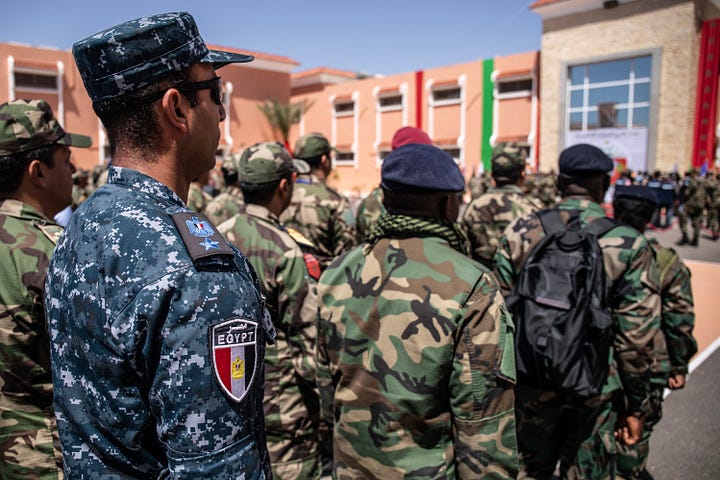This week’s dispatch moves between Egypt’s eroding regional clout and its tightening grip at home. As Trump’s tour skips Cairo in favor of Gulf capitals, Egypt scrambles to manage mounting internal pressures: protests against judicial fees, factory strikes over unpaid wages, and a worsening water crisis in Sinai. Meanwhile, the regime deepens its reliance on military-run institutions, foreign gas deals, and discounted Suez Canal tolls to shore up a teetering system. With repression intensifying—from security crackdowns to transnational targeting of exiles—the state continues to centralize control while ceding strategic assets and policy autonomy to outside powers.
📁 Palestine
Revisiting the Nakba in al-Ahram headlines.
Dozens of activists protested in front of the Journalists Syndicate in downtown Cairo on Thursday, in solidarity with Palestine, marking the Nakba anniversary.
Trump’s first Arab tour summarizes where regional power currently lies: in Riyadh, Doha, and Abu Dhabi. Under Sisi, Cairo is merely a former regional hegemon, reduced to a beggar state.
Trade between Egypt and Israel reached $3.2 billion in 2024, rising from $2.64 billion the previous year—a 21% increase—despite widespread outrage over the Gaza war. According to CAPMAS data, Egypt’s imports from Israel surged by 17%, largely driven by increased purchases of natural gas. Egyptian exports to Israel also nearly doubled, climbing from $145 million in 2023 to $284 million in 2024. This surge in economic exchange occurs amid diplomatic tensions: Cairo has yet to officially receive the credentials of Israel’s new ambassador. However, relations remain diplomatically and commercially intact, and Israeli tourists continue to enter Sinai visa-free through the Taba crossing. Cairo also recently suspended plans to support South Africa’s genocide case at the ICJ. Egypt has hosted several rounds of ceasefire talks with Israeli officials this year, even as its trade with Tel Aviv grows in the face of public and regional backlash.
📁 Suez Canal
Keen to attract global shippers once again to its waters, the Suez Canal Authority announced Tuesday a 15% discount on transit fees for container ships with a net tonnage of 130,000 tons or more, whether loaded or empty, starting Thursday, 15 May, for 90 days.
📁 Egypt, Israel Join Over 50 Countries in Military Exercise


Service members from more than 50 countries stood in formation on 17 May during the graduation ceremony of the academics phase of African Lion 2025 (AL25) in Agadir, Morocco.
The annual exercise—Africa’s largest—brings together 10,000 troops from across the globe, including Egypt and Israel, for extensive multi-domain training aimed at strengthening interoperability and combat readiness.
AL25, led by the US Army Southern European Task Force, Africa (SETAF-AF), runs from 14 April to 23 May across Morocco, Tunisia, Senegal, and Ghana.
📁 UAE Pushes Further into Egypt’s Coastline with Bid to Control Alexandria Terminal
The Emirati race to take over Egyptian ports continues. Last week, Abu Dhabi Ports Group put forth a proposal to operate, manage, and maintain the passenger terminal at Alexandria Port for a duration of 15 years.
📁 Egypt Eyes Qatari Gas
Amid mounting domestic energy pressures, Egypt is stepping up efforts to secure liquefied natural gas (LNG) from Qatar. Last week, the Egyptian Petroleum Minister met with Qatari energy officials in Doha to discuss accelerating joint projects and signing long-term supply contracts. The aim: to stabilize Egypt’s gas supply during the peak summer months and avoid a repeat of the blackouts that have plagued recent years.
This shift comes at a politically significant moment. For years, Egypt has relied heavily on Israeli gas, importing around 8.6 billion cubic meters (bcm) in 2023—roughly 13% of its total supply. Despite the Gaza war, Israeli gas exports to Egypt surged, underscoring how trade persisted even amid widespread regional outrage. Cairo’s outreach to Doha signals an attempt to diversify its energy sources without openly undermining its peace deal with Israel. Closer energy ties with Qatar also align with warming diplomatic relations and could enhance Egypt’s strategic leverage in the region.
Economics, however, is driving the urgency. Domestic production has dropped to 4.3 billion cubic feet per day (bcf/d), far below the ~6 bcf/d needed in the summer. Imports have become essential. Egypt has already begun leasing floating regasification units, and Qatar—one of the world’s top LNG exporters—is a natural partner. With production capacity set to grow from 77 to 126 million tons annually by 2027, Qatar is well-positioned to meet Egypt’s shortfall.
Still, infrastructure remains a bottleneck. Egypt’s import terminals and a secondary arrangement with Jordan can only handle limited volumes, but capacity is expected to expand. Officials on both sides are reportedly eager: Egyptian statements emphasize securing “natural gas supplies for local needs,” and discussions are underway about broader Qatari investments in Egyptian gas exploration.
Meanwhile, the fragility of Egypt’s energy dependency was underscored this week. The government cut gas deliveries to fertilizer and methanol factories by 50% for 15 days, after Israel notified Cairo of maintenance work on a key export pipeline—reducing supplies below the levels promised for the summer. While Israeli gas won’t disappear from Egypt’s mix anytime soon, Cairo is clearly preparing for a more diversified, and possibly more politically flexible, energy future.
Talks with Russia to build new LNG terminals and a new Turkish agreement to deploy a Floating Storage Regasification Unit (FSRU) to Egypt—its first overseas assignment—further illustrate the emerging multipolar energy strategy.
📁 Militarization
Minister of Water Resources and Irrigation, Hani Sewilam, met last week with a group of newly recruited engineers set to join the ministry on 1 July, following the completion of a six-month ideological indoctrination boot camp at the Egyptian Military Academy.
The army announced yesterday a new cooperation protocol between its Administration of Signal Corps, which was absorbed into the Military Intelligence in 2021, and the Suez Governorate to provide services via the National Emergency and Public Safety Network. The protocol was signed by Maj. Gen. Hani Mahmoud Mansour, Commander of the Signal Corps, and Maj. Gen. Tarek Hamed al-Shazli, Governor of Suez.
According to the official statement, the initiative comes in line with Sisi’s directives to maximize the use of the emergency network in support of the state’s long-term development goals and Egypt’s Vision 2030. The protocol aims to enhance communication infrastructure and digital transformation, and build an integrated system for emergency and rescue management in the province.
This agreement is part of a broader militarization of local governance, digital infrastructure, and public service delivery, consolidating military control over civilian sectors under the guise of modernization and security.
The Air Force-run Future of Egypt Project for Sustainable Development abruptly suspended all fishing operations in Lake Bardawil on Saturday following a mass walkout by local fishermen. The fishermen had refused new regulations imposed by the project’s administration at the start of the season on 25 April, citing high costs, invasive oversight, and declining catches.
This marks the first season under military control, after management of the lake was transferred from the Fisheries Protection Authority in late 2024. Protesters accused the administration of raising fishing permit fees, interfering in private sales, and threatening to replace local crews with fishermen from other governorates.
Tensions escalated after Future of Egypt reportedly confiscated boats and allowed only 40 out of 1,228 vessels to operate. The administration’s response, warning of legal action against alleged “instigators,” has deepened local anger, reinforcing fears that the lake’s development is serving military interests over community livelihoods.



